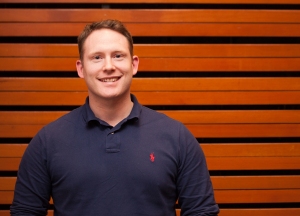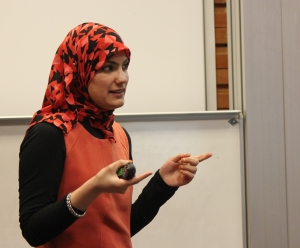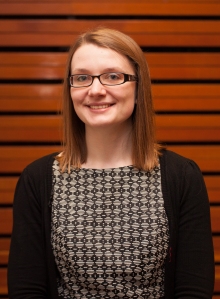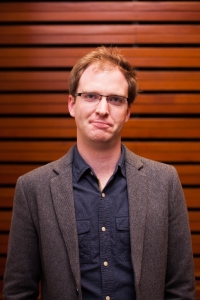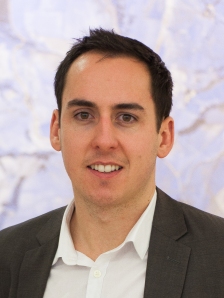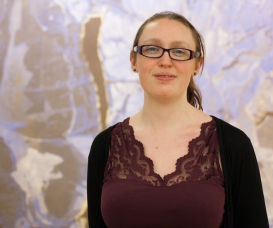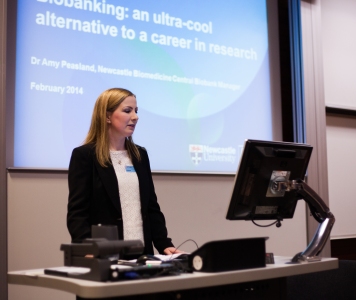Financial Software Development
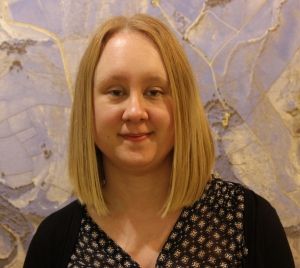 Hannah Boulding [BSc(Hons) Medical Genetics, 2009) spoke during the 2015 Careers After Biological Sciences. She explained how she had gone from an initial bioscience degree, via a PhD in Bioinformatics at the University of Oxford, to end up developing finance software for Bloomberg, a multinational corporation with interests in several sectors.
Hannah Boulding [BSc(Hons) Medical Genetics, 2009) spoke during the 2015 Careers After Biological Sciences. She explained how she had gone from an initial bioscience degree, via a PhD in Bioinformatics at the University of Oxford, to end up developing finance software for Bloomberg, a multinational corporation with interests in several sectors.
Emergency Medicine
Andrew Lindsay [BSc (Hons) Medical Biochemistry, 2002] is a Specialist Registrar in Emergency Medicine, currently working in London. Andy went on to study Medicine at Newcastle University and has subsequently worked in a variety of roles, both in the UK and Australia.
Andy gave a clear insight into the stresses of working in Emergency Medicine, but also the exciting and varied possibilities that the role can involve, including working with airborne emergency services and acting as the senior doctor at the London 2012 Olympics and other major sporting events.
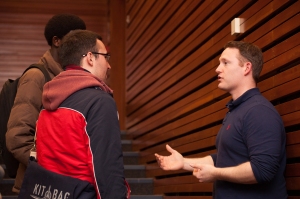
Andy offered practical advice on applying for Medicine courses after graduation (photo credit: Maks Swiderek )
.
As well as describing the life of an emergency doctor, Andy also offered practical advice for those considering applying to medical school after graduations from their original bioscience degree.
A transcript of his talk is available here.
Research Technician
Shairbanu Ashra [BSc(Hons) Medical Biochemistry, 2004] works in the Protein & Nucleic Acid Chemistry Laboratory at the University of Leicester.
As she explained in her presentation, contemporary science needs a variety of specialist support services which researchers don’t need in their own team, but need to be able to draw upon when needed. One such service involves analysis of protein samples to see what they contain. Mass Spectrometry is one way to achieve this. It can reveal important and interesting new interactions (as well as sometimes revealing that someone has accidentally got their sample contaminated with a standard lab protein – embarrassing, but good to know if it saves months of labour on the wrong thing!)
A transcript of Shairbanu’s talk is available here.
Knowledge Exchange Manager
Hayley Shaw [BSc(hons) Biological Sciences (Physiology and Pharmacology), 2007] initially wanted to be a lollipop lady. Having been encouraged into a biology degree at Leicester by an enthusiastic teacher, she assumed this would lead onto some sort of ground-breaking research on AIDS or cancer. However recognising that she actually enjoyed talking about science more than labwork this started to evolve into an interest in pharmaceutical sales. Things took an unexpected turn, however, when she visited a graduate recruitment consultant to discuss her options, and they asked her to work for them!
For a while, therefore, she worked as the middle-man linking up graduates with appropriate companies. Having interviewed something between 300 and 400 graduates and investigating the different roles they could go into, Hayley was drawn to Knowledge Transfer management.
Her first Knowledge Exchange Manager role was in the newly formed Risk Centre at Cranfield University. This is still where she works, though the role has expanded, with the unit becoming the Institute for Environment, Health, Risks and Futures. Her job involves acting as a broker between knowledge generators (the University) and a variety of clients, including government departments and industry, who want to know about specific emerging issues.
Hayley stressed the importance of recognising and taking seriously the variety of skills that students on Biological Science courses are developing during their studies. If you are interested in science communication then look for existing opportunities to demonstrate an ability to communicate complex ideas in simple ways, including blogging or running a science cafe. She concluded by emphasising the need to “know your skills and know what you love”.
A transcript of her talk is available here.
NHS Genetic services
Jon Williams [BSc(hons) 2007, PhD 2011] gave a talk in the 2014 CABS season about the work of a Clinical Scientist in the NHS, and specifically the Genetic services. The emergence of so-called Next Generation sequencing has massively reduced the cost of DNA sequencing and is opening up the prospect of genomic medicine. Jon illustrated this with a variety of examples from his own experience. He spoke extensively about the Scientist Training Programme, which he was just completing (this programme is now co-ordinated by the National School of Healthcare Science, with applications opening in January of each year, although it is recommended to attend the information days in the preceding autumn). A transcript of Jon’s talk is available here.
Food Industry
Tom Sanders [BSc(Hons) Biological Science 2006] works as an Applications Manager for Tate & Lyle Sugar. By his own admission, Tom’s initial move into food manufacture was not a long-held ambition – he was contacted by a recruiter when he shared his CV online. Since then, however, he has worked for four major food companies in a variety of roles. Tom emphasised how valued a scientific background was within the industry, and how much science was involved in perfecting even relatively straightforward products like bread. He described a broad range of jobs within the food production sector. A transcript of his talk is here.
Clinical Trials Pharmacist
Michelle Donnison [BSc(Hons) Medical Physiology, 2011] is a Senior Pharmacy Technician at York Hospital, working on the conduct of clinical trials.
Michelle talked us through the varied roles that her current job involves, including the setting up of trials, dispensing of medicines, liaising with sponsors and hosting monitoring visits.
Unusually, Michelle had taken some of the relevant qualifications for her role before taking her degree, but she indicated which clinical trial related jobs would be done with a bioscience degree, or with additional training after a bioscience degree.
As well as the specifics of the role, Michelle also gave a very nice overview of the way that clinical trials are generally conducted.
A transcript of her presentation, and the Q&A session afterwards, is available here.
Biobank Manager
Amy Peasland graduated in 2000 with a BSc(Hons) in Biological Sciences (Microbiology, European Union). During this initial degree, She spent a year conducting research at the University of the Algarve, Portugal. Having developed a growing interest in cell biology and cancer, she stayed on in Leicester to complete an MSc in Molecular Pathology and Toxicology. Amy followed this with a PhD on childhood leukaemia in Newcastle.
Amy is now the manager of the Central Biobank in Newcastle. This is a facility where human tissue specimens, for example “waste” bone when someone has a hip replacement, or cancerous tissue removed from a tumour, is stored. Academics and biomedical companies can apply to use these samples in their research. As well as describing this role, Amy gave some sensible advice on choosing the “right” PhD for you, and on knowing when and why to swap from an academic career into a more secure post. She was also able to offer some insights into the merits of doing a sandwich year.
As well as the slides (above), a transcript of Amy’s talk is available here.
Science Teaching (and Tutoring)
Moving into teaching is a subject that we consider at regular intervals as part of the CABS programme. In the past we have had presentations from alumni at various stages of their careers (including Science teaching: In the classroom and beyond and Teaching biology overseas).
In 2013, we asked three former students – Hajra Kali, Nailah Sattar, Mital Thanki – all of whom had graduated in 2010, to come and share some advice based on their experiences during qualification and their early days of classroom practice. Rather than formal presentations, the format on this occasion was a Q&A session. The main points emerging from the conversation are summarised below.
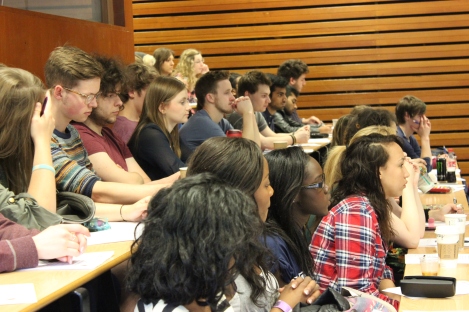
At the time of the event, Hajra was working at Soar Valley Community College and Nailah was at Wyggeston and Queen Elizabeth I Sixth Form College (known locally as “QE”). Mital was teaching at Longslade Community College, as well as running a Tutorial business in her spare time. Since then, however, she has expanded the Tutorial work, a role she has now taken on full-time.
Thank you for sparing time this afternoon to come and discuss teaching with us. I wonder if I might start by asking you to say a bit about the context in which you are teaching at the moment, and what training route you went through.
Nailah: I did a PGCE at the School of Education, here in Leicester. I trained to teach secondary science, so that Year 7 (age 11) upwards. I knew that I wanted to focus on the high year groups, particularly A level, but it’s pretty rare for jobs to come up for newly qualified teachers which are that specific. However, a post was advertised at QE, the sixth form college next door, so I applied and I got the job. Read more…
HR: Human Resources
The 2013 season of CABS talks included a presentation about working in human resources. Susie [BSc(Hons) Medical Biochemistry] works for pharmaceutical company Roche. She describes some of the work of the company, her role in the area of pensions provisions and a little about the – convoluted – journey by which she came to have her present role. The presentation concludes with some excellent general advice. The “Slidecast” feature of Slideshare is no longer supported, so the audio has been provided using Soundcloud.
